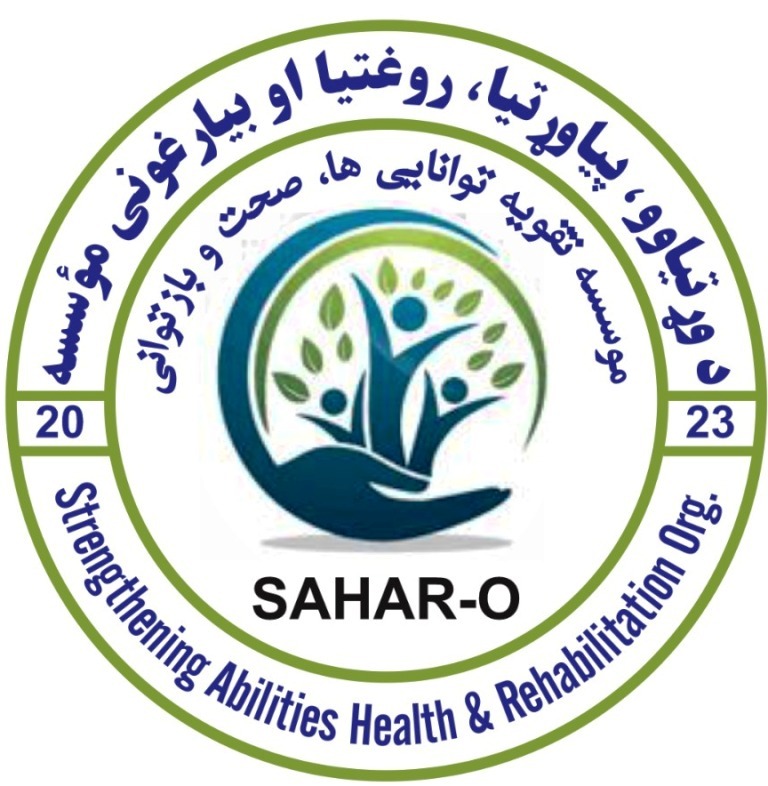SAHAR-O Prioritized areas of interventions:
SAHAR-O is technical expert national organization; their key staffs are having extensive experience in the implementation of donors funded program interventions in Afghanistan during the past two decades. The focused areas of SAHAR-O are listed as here
1. Health
a) Provision of Primary, secondary and tertiary healthcare services
b) Health education
c) Health screening (low vision, low hearing, Delay development, TB, Hepatitis, HIV)
d) Family Planning
e) Basic mental health education
f) counseling and coaching
g) Basic reproductive health education
h) Gender development
i) Health Promotion and prevention
2. Disability Prevention and Psychosocial Rehabilitation:
a) Psychosocial Rehabilitation
b) Physical Rehabilitation (Assistive devices, Prosthetics & Orthotics cares and Physiotherapy)
c) Livelihood
d) Disability rights and awareness
e) Empowerment
3. Education:
a) Basic education/life skill education
b) Literacy
c) Formal and informal education
d) Community Based education.
e) Primary and secondary education
f) Higher education
4. Community development services:
a) Collect real and specific data to arrange and provide services on the base of survey
b) priority seating
c) listing local resources
d) Conduct different, social attitudinal and cultural studies to find the main barrios for the women empowerment.
e) Providing seasonal cloths, shelters repair and for women, girls, people with disabilities and people with weak economics.
f) Conduct awareness session in the community about the community empowerment
g) Poverty reduction trough community empowerment
h) Environment protection
i) Development of infrastructure
j) Agriculture, irrigation and livestock.
5. Advocacy, Empowerment and Awareness of community leader, policy makers and Services Providers :
a) GBV Training.
b) Role of women in the socioeconomic development.
c) Training in the formation of self-help groups and other forms to play a leading role in women and other marginalized group empowerment
d) Leadership and management training.
e) Early child development training
f) Vocation training, self-employment, business development and marketing
g) Advocacy training
h) Disability awareness, UN Conventions and other right based training.
i) Psychosocial support trainings.
j) Reproductive health trainings.
k) Nutrition trainings
l) Health Promotion.
m) Prevention and Education training
n) Human rights and advocacy training
o) Life skill training
6. Capacity Building and Vocational training:
a) Prosthetics and Orthotics Trainings.
b) Building the inclusive vision in society to accept diversity and inclusion
c) Training on inclusive and special education, Community Based Rehabilitation.
d) Vocational Training (Mobile Repairing, Tailoring, prosthetics, orthotics and physical therapy)
e) Disability, human right and child right training.
f) Mobility training.
g) Life coaching.
h) Self- development interventions.
i) Speech therapy and its art.
j) Happy family tips.
k) Problems solving skills.
l) Training on local problems and local solution.
m) Leadership and Management training.
n) Development strategies and inclusive policies.
o) Organizational development.
p) Good governance.
7. Investigation/ Research/ Studies:
a) Studies on the main causes of the poor education, less participation of women in the community and socioeconomic development of the families and education.
b) Studies on the low participation of girls in higher education.
c) Study regarding the current status of gender mainstreaming in the current and future projects.
d) Studies to find out how the current policies, strategies, long and short term planning are gender sensitive and gender friendly
e) Studies to find out the contribution, participations and memberships of women in the existed international, regional, national, sub national and local networks and forums.
f) Study on the degree of involvement and consultation of women in regard to their specific projects and all the national development and services provision agendas
g) Assessment of the different programmes.
